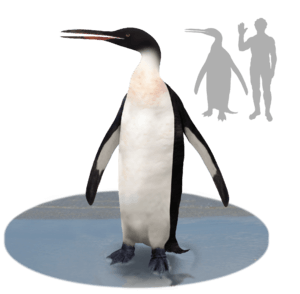Kairuku facts for kids
Quick facts for kids Kairuku |
|
|---|---|
 |
|
| Artist's impression of Kairuku | |
| Scientific classification |
|
| Kingdom: | Animalia |
| Phylum: | Chordata |
| Class: | Aves |
| Order: | Sphenisciformes |
| Genus: | †Kairuku Ksepka, Fordyce, Ando & Jones, 2012 |
| Type species | |
| Kairuku waitaki Ksepka, Fordyce, Ando & Jones, 2012
|
|
| Species | |
|
|
Kairuku is the name of a very old, extinct type of penguin. It's like a prehistoric penguin that doesn't live anymore! Scientists have found bones from two different kinds of Kairuku: K. grebneffi and K. waitaki. These amazing fossils are about 27 million years ago and were discovered in New Zealand.
Contents
Meet Kairuku, the Giant Ancient Penguin!
Kairuku was a genus of ancient penguins that lived millions of years ago. Unlike the penguins we see today, some Kairuku species were much, much bigger! Imagine a penguin taller than most kids. These birds are known only from their fossilized bones, which tell us a lot about what they might have looked like and how they lived.
When Did Kairuku Live?
The fossils of Kairuku show that these penguins lived during a time called the late Oligocene. This was about 27 million years ago. To give you an idea, that's long before humans even existed! The world was a very different place back then.
Where Were Kairuku Fossils Found?
All the known bones of Kairuku have been found in New Zealand. Specifically, they were discovered in a place called the Kokoamu Greensand Formation. This area is known for its rich fossil deposits, which help scientists learn about ancient life. Finding these fossils in New Zealand makes sense, as penguins are often found in the Southern Hemisphere.
How Big Was Kairuku?
One of the most exciting things about Kairuku is its size. Some species, like Kairuku grebneffi, were very large. They could stand up to 1.3 meters (about 4 feet 3 inches) tall and weigh around 60 kilograms (about 132 pounds). That's much bigger than the largest living penguins today, like the Emperor Penguin.
Comparing Kairuku to Modern Penguins
Modern penguins are amazing swimmers and divers. Scientists believe Kairuku was also a fantastic swimmer. Its large size might have helped it dive deeper and stay underwater longer to hunt for food. Its bones suggest it had strong flippers, perfect for moving through the ocean.
What Did Kairuku Eat?
Like modern penguins, Kairuku likely ate fish and squid. They would have used their powerful flippers to chase prey in the ancient oceans around New Zealand. Their large size might have given them an advantage in hunting bigger or faster prey.
How Do We Know About Kairuku?
Scientists learn about Kairuku by studying its fossil bones. When an animal dies, its bones can sometimes turn into rock over millions of years. These fossils act like clues from the past. By carefully examining the bones, paleontologists can figure out how big the animal was, what it looked like, and even how it moved.
The Discovery of Kairuku
The genus Kairuku was officially named and described in 2012. A team of scientists, including Ksepka, Fordyce, Ando, and Jones, studied the fossil bones and realized they belonged to a new type of ancient penguin. This discovery helped us understand more about the history of penguins on Earth.
Images for kids
See also
 In Spanish: Kairuku para niños
In Spanish: Kairuku para niños
 | Janet Taylor Pickett |
 | Synthia Saint James |
 | Howardena Pindell |
 | Faith Ringgold |


